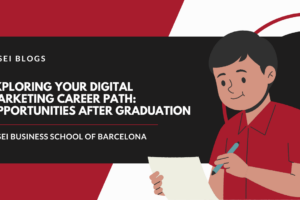
So you’ve just graduated? Here are 5 things you need to do now

Graduating from university with a bachelor’s or master’s degree is a big step for anyone and a huge achievement. You deserve to celebrate, but there’s no time to relax!
You can be sure that your former classmates and graduates from all over the country are now all vying for the same jobs in the same companies in a competitive job market.
It’s time to start getting noticed by the right people and prepare yourself to enter the world of work. Once you’ve written a good cover letter and updated your resumé, what else can you do to make yourself stand out?
Draw up a vision statement
First jobs after graduation are rarely perfect fits – and, unfortunately some people bounce around from place to place without any direction. If you want a fulfilling career, that is something you should avoid. One way to focus at this early stage is to think about what you want by drawing up a vision statement.
This is a short piece of writing that will help you clarify what you want to do, what you are good at, and maybe even uncover a few hidden passions of yours.
While everyone’s vision statement is unique—and there’s no set way of doing it—you can start by asking yourself a number of simple questions:
What am I passionate about?
Write down the things that excite you. While not everything you think of will lend itself to a career, it might get you thinking about industries you can target, or companies or areas you’d enjoy working for.
What did I learn on my degree course?
You learned a lot, of course! But write down some of the key things you are good at and also those skills that you think are in demand and will help you most in your work life.
How would I describe my key skills?
You might be a whizz at excel, programming, PhotoShop, or have excellent presentation skills. Write down anything and everything that you can bring to the table.
What is my perfect job?
This is a hard one! And it’s certainly going to be different for everyone. If you don’t have any idea of what you want to do, think about all the things it could involve, such as; travel, public speaking, client meetings, creativity, programming, etc.
While you won’t find a job that ticks all the boxes, you’ll have a clearer idea of what you’re looking for.
What would a career path to getting that perfect job look like?
Whether you can name that perfect job or not, start thinking about what a career pathway to getting that perfect job would be like. Talk to your careers advisor at university if you’re not sure how to do this – they may even have some great suggestions for you!
This vision statement will also help you when writing your cover letters and personalising your resumé or Linkedin profile.
Do a social media spring clean
Okay, you’ve already updated your LinkedIn. But social media doesn’t stop there. Think about your other accounts, linked to your email addresses and name that your future employers (and future interviewers) may look at.
Anything in the public domain could certainly be used when considering you for a position. Embarrassing photos or posts that go against company policy or culture could stop you in your tracks – no matter how dazzling you were in your interview.
Check what you’ve put out online and make it private – or, better yet, delete anything that could come back to bite you. A personal online brand is an important part of your identity, don’t underestimate it.
Use your network
So now that you’ve graduated, have a clearer vision of your future and have cultivated a strong personal brand, it’s time to get talking.
Many of us have hundreds – if not thousands – of people in our personal networks. When combined with our second degree networks, we are connected to a mind-boggling number of opportunities.
Your network is therefore perhaps your most powerful tool when job hunting. It’s important to tell people, older relatives, former schoolmates, even ex-colleagues that you have graduated and you are looking for a new position.
Make the most of your university
Your tutors, the faculty staff and classmates can all be very helpful resources when looking for a new job – both right now and in the future.
You should stay in touch with fellow alumni – you never know when they might have an opportunity for you, or, indeed, you for them. When searching for jobs, you might also find useful opportunities for your friends – so be sure to pass them on and they will likely return the favour.
But even more importantly, you should make the most of your university careers service – as it is there for this exact purpose.
At ESEI we have a very helpful team of careers advisors and we love to help our students with their resumés, finding opportunities and taking the next step.
Go for it!



